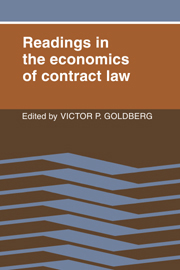Book contents
- Frontmatter
- Contents
- Preface
- Readings in the economics of contract law
- Part I Some preliminaries
- Part II Contract law and the least cost avoider
- Part III The expectation interest, the reliance interest, and consequential damages
- Part IV The lost-volume seller puzzle
- Part V Specific performance and the cost of completion
- Part VI Power, governance, and the penalty clause puzzle
- Part VII Standard forms and warranties
- Part VIII Duress, preexisting duty, and good faith modification
- Part IX Impossibility, related doctrines, and price adjustment
- 9.1 Impossibility and related doctrines in contract law: an economic analysis
- 9.2 Impossibility and related excuses
- 9.3 Price adjustment in long-term contracts
- Questions and notes on impossibility and price adjustment
- References
- Index of cases
- Author index
- Subject index
9.2 - Impossibility and related excuses
Published online by Cambridge University Press: 10 November 2010
- Frontmatter
- Contents
- Preface
- Readings in the economics of contract law
- Part I Some preliminaries
- Part II Contract law and the least cost avoider
- Part III The expectation interest, the reliance interest, and consequential damages
- Part IV The lost-volume seller puzzle
- Part V Specific performance and the cost of completion
- Part VI Power, governance, and the penalty clause puzzle
- Part VII Standard forms and warranties
- Part VIII Duress, preexisting duty, and good faith modification
- Part IX Impossibility, related doctrines, and price adjustment
- 9.1 Impossibility and related doctrines in contract law: an economic analysis
- 9.2 Impossibility and related excuses
- 9.3 Price adjustment in long-term contracts
- Questions and notes on impossibility and price adjustment
- References
- Index of cases
- Author index
- Subject index
Summary
The importance of the impossibility defense is circumscribed by the ability of the parties to contract around the law. If the law were too liberal in excusing performance, the parties could narrow the range of acceptable excuses by explicit contractual language. Conversely, if the law were too niggardly, the parties could enumerate additional circumstances that would justify discharge of the contractual obligations. If the law were badly out of line in either direction, the problems could be vitiated by proper drafting of force majeure clauses. Such clauses, which are very common, will suspend or discharge a promisor's obligations for “acts of God.”
Indeed, it should not really matter whether we frame the problem of excuse in terms of implementing the parties' decision (“Does the fire constitute an act of God that excuses performance as per the initial agreement?”) or of identifying the conditions that would justify excusing performance (“Does the fire make performance impossible?”). Even if a contract had no force majeure clause, a court might infer that the parties would have included one had they thought of it. That is, instead of recognizing an impossibility defense, the court could achieve the same result by interpretation of a force majeure clause, express or implied.
Regardless of how the doctrine is labeled, courts, when considering a plea to excuse performance, should be constrained by the fundamental question: What would the parties have chosen? I will argue that, as a general rule, parties would not agree to excuse performance because of changed market conditions (neither supply nor demand shocks).
- Type
- Chapter
- Information
- Readings in the Economics of Contract Law , pp. 221 - 224Publisher: Cambridge University PressPrint publication year: 1982
- 1
- Cited by



